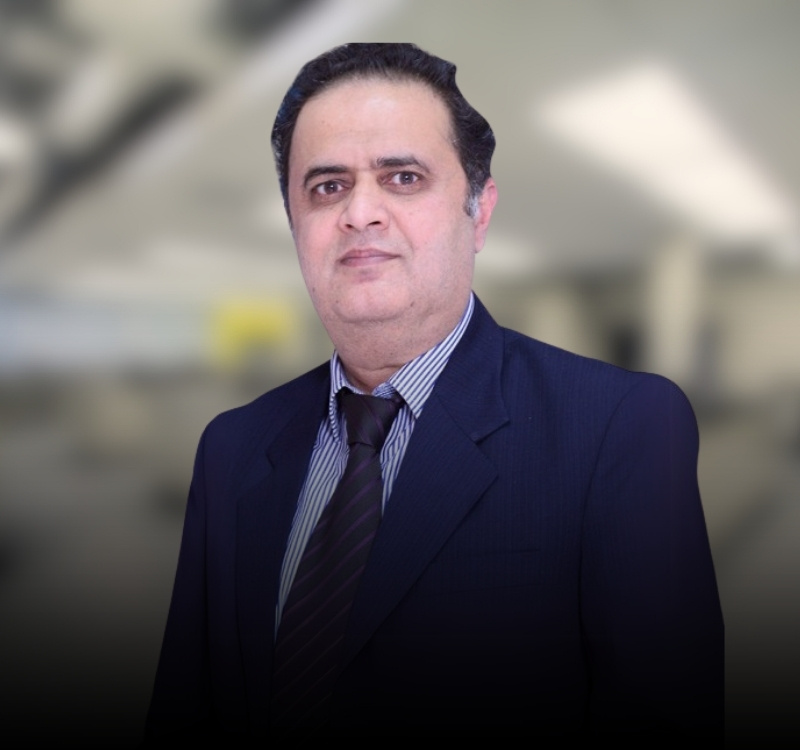DR. ALI HYDER BAIG
Associate Director-Basic Research
Research Center

Research Interest
Stem cells and regenerative medicine, Cell state and cell type specific gene therapy, metabolism and metabolic rewiring in tumor microenvironment, Immuno-oncology & Immunotherapy
Overview
Dr. Ali Hyder Baig did his M.Phil. from National Institute of Biotechnology and Genetic Engineering (NIBGE) Faisalabad and Ph.D. in stem cells & regenerative medicine from Friedrich-Schiller-Universität in Jena, Germany. With over 15 years of experience in academia and research across various institutions in Germany, he has made significant contributions to stem cells and transplantation, and the response of stem cells in diseased microenvironments. His expertise also extends to metabolism rewiring in disease progression, immunology, and the molecular mechanisms behind cellular immune surveillance. Dr. Baig has served as a Postdoctoral Scientist at the Leibniz Institute on Aging / Fritz Lipmann Institute (FLI) in Jena Germany, where he focused on stem cells and regenerative medicine research. While working at the German Cancer Research Center (DKFZ) in Heidelberg, he uncovered key molecular mechanisms in cellular and mitochondrial translation, and senescence immune surveillance. As a Research Scientist in the joint program between Universitätsmedizin Mainz and Boehringer Ingelheim Pharmaceuticals Germany, he played a crucial role in developing cell-type and tissue-specific gene therapy systems. Dr. Baig has been actively involved in multidisciplinary research, collaborating with numerous international research institutions, and has an impressive portfolio of publications in prestigious high-ranking scientific journals.
Education & Training
- Ph.D. in stem cells & regenerative medicine, Leibniz Institute on Aging / Fritz Lipmann Institute (FLI) / Friedrich-Schiller-Universität, Jena, Germany 2017.
- Research fellowship from Institute of Molecular Medicine and Max-Planck-Research Group on Stem Cell Aging, Ulm, Germany 2009.
- Phil. National Institute for Biotechnology and Genetic Engineering (NIBG), Faisalabad, Pakistan 2005.
- FELASA-B animal course, training on handling lab animal and stem cell transplantation, Berliner Kompaktkurse, Berlin, Germany 2016.
- Flow cytometry training – BD FACSAria™ III Cell Sorter and BD LSRFortessa™ Cell Analyzer System key operator training including drop delay and compensation methods, Jena, Germany 2013.
- Training on cellular reprogramming – Induced pluripotent stem cells (iPSCs) generation from fibroblasts and handling, Ulm, Germany 2011.
Publications
- Dual Ribosome Profiling reveals metabolic limitations of cancer and stromal cells in the tumor microenvironment (2025) Nature Communication (doi: 10.1038/s41467-025-59986-7).
- P53-dependent hypusination of eIF5A affects mitochondrial translation and senescence immune surveillance (2024) Nature Communication (doi: 10.1038/s41467-024-51901-w).
- Revealing Acute Consequences of Rapid Protein Elimination at Individual Synapses using Auxin-Inducible Degron 2 Technology (2024) Nature Communication (NCOMMS-24-71383-T in review).
- Exploiting mitochondrial translation to uncover compartment-specific metabolic vulnerabilities1Equal contribution (in process).
- Identification of novel Hox target genes with essential roles in hematopoietic stem cell self-renewal and differentiation (in process).
- Elevated Hedgehog activity contributes to attenuated DNA damage responses in aged hematopoietic cells (2019) Leukemia (doi: 10.1038/s41375-019-0641-3).
- Epigenetic stress responses induce muscle stem cell aging by Hoxa9 developmental signals (2016) Nature (doi: 10.1038/nature20603).
- Genotyping of HCV RNA reveals that 3a is the most prevalent genotype in Mardan, Pakistan (2014) Advances in virology (doi: 10.1155/2014/606201).
- Molecular Mechanisms of Muscle Stem Cell Aging (2012) Advance in Stem Cell Aging (Vol. III, Karger, pp 100-111).

